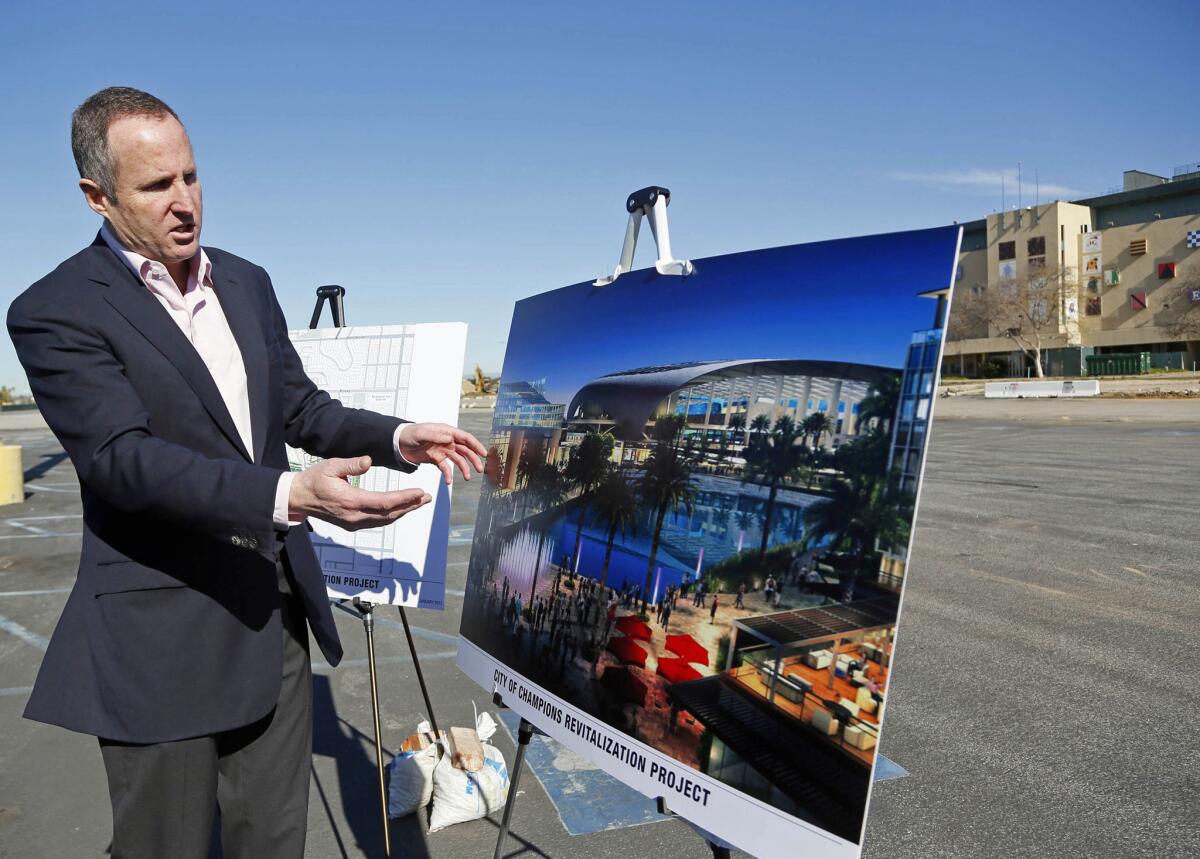Tax breaks do figure into NFL stadium plan in Inglewood

When developers and city officials unveiled plans last week for an NFL stadium in Inglewood, they painted a picture of a rare thing: A big-ticket project completed with no tax money whatsoever.
Turns out itâs not that simple.
Plans filed by the Hollywood Park Land Co. â a development group that includes St. Louis Rams owner Stan Kroenke â call for a stadium that would be built with probably more than $1 billion in private money, but which would eventually recoup tens of millions from Inglewood taxpayers once it opens. Itâs a relatively modest public tab in a world where upfront subsidies approaching $500 million are not unusual. But itâs not what Chris Meany, Hollywood Parkâs senior vice president said last week, either.
âThere will be no public dollars, no taxpayer dollars used for this project,â he said. âThe entire project has been privately capitalized and is being privately funded.â
The nuance between that statement â similar claims were made by Inglewood Mayor James Butts â and tax breaks that could reach $100 million lies in the fine print of a 185-page initiative plan filed by the developers earlier this month. It includes two paragraphs of how Inglewood would eventually reimburse the project for the costs of roadwork, utility work and public parks on the nearly 300-acre site. Meany estimated those costs at $60 million. The city would also reimburse costs of security, medical services and shuttles to off-site parking during stadium events, which Butts estimated at about $8 million a year.
These payments would only kick in after the project is generating at least $25 million a year in tax revenue for Inglewood â a city with a general budget of about $86 million â and will only cover things a local government would normally provide, Meany said.
âThe only money in this is for public things,â Meany said Monday. âAnd not a single dollar of reimbursement will come to us until the city has had an extraordinary payday.â
While it is a lot of money by any means, itâs far less than taxpayers have put up in other stadium deals. State and local governments in Minnesota issued $498 million in bonds to help fund a new stadium for the Vikings in Minneapolis. Civic leaders in St. Louis on Friday proposed roughly $400 million in state bonds and tax credits to help finance a stadium to keep the Rams there.
But the reimbursement â first reported by the Associated Press on Monday â could dampen trust in the stadium proposal, said Raphael Bostic, a professor of governance and public policy at USC. And that could pose a hurdle for a project that could need Inglewood voters to approve a zoning change later this year.
âThe process by which these things happen goes a long way toward determining their outcome,â Bostic said. âThis is one of those where it could really lead people to become skeptics.â
Bostic said voters â and city officials â ought to think about how much bang theyâll get from whatever bucks the developers eventually recoup.
âThe biggest consideration ought to be what sort of things, what spillovers, could be generated by this stadium to justify thatâ [public investment, he said. âIn general, thereâs a mixed record.â
To Butts, the stadium is a great deal. He said Monday he fully supports the project and is willing to trade a little tax money down the road for a big development today.
âThere are no tax dollars going toward private infrastructure,â he said. âThe only thing that will happen is when we are making $25 million that we never wouldâve had â in excess of that even â will we start to pay back what was basically loaned to us by the developers.â
As for Meany, he said his development team isnât trying to mislead anyone, and theyâll be glad to make their case publicly later this year.
âWe filed this in a public document,â he said. âWeâre not hiding anything.â
Times staff writer Andrew Khouri contributed to this report.
Twitter: @bytimlogan
More to Read
Go beyond the scoreboard
Get the latest on L.A.'s teams in the daily Sports Report newsletter.
You may occasionally receive promotional content from the Los Angeles Times.












